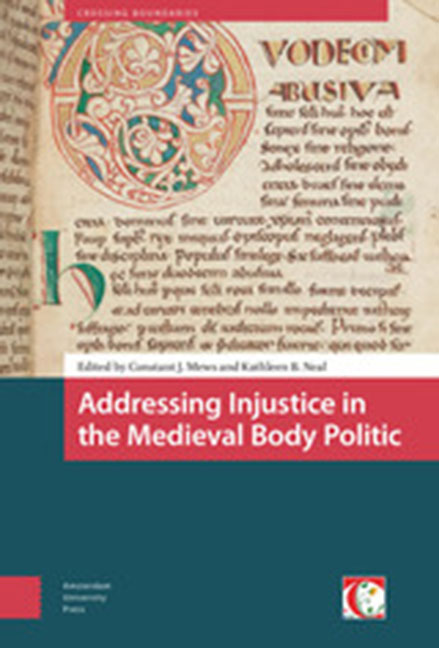Book contents
- Frontmatter
- Contents
- Acknowledgements
- Abbreviations
- Note on References
- List of Tables and Illustrations
- Introduction: Justice and its Abuse in the Medieval Body Politic
- 1 The De XII abusiuis saeculi: Contexts and Textual Traditions
- 2 The Irish Background to the De XII abusiuis saeculi
- 3 ‘Each in the Calling to Which They are Called’: Images of Authority in the De XII abusiuis saeculi
- 4 Transforming Irish Traditions: De XII abusiuis saeculi and Justice in the Frankish World, c. 750–1050
- 5 The Unjust King and the Negligent Bishop: Addressing Injustice in Eleventh and Twelfth-Century England and Germany
- 6 Reflecting on Abuses in Religious Life: From The Twelve Abuses of the Cloister to The Cloister of the Soul
- 7 Preaching the Body Politic: John of Wales and Franciscan Political Thought in the Late Thirteenth Century
- 8 Justice and Its Abuses in the Speculum justiciariorum
- 9 Addressing Abuses and Injustice in the Court of Philip the Fair: The De informatione principum of Durand of Champagne
- 10 ‘Perfect Justice Weighs Everything on a Balanced Scale’: Italian Friars on Equity, the Common Good, and the Commune c. 1270–c. 1310
- 11 Some Late Franciscan Rewritings of the Twelve Abuses
- Appendix: On the Twelve Abuses of the Age A Translation
- Bibliography
- Index of Biblical References
- Index of Manuscripts
- General Index
4 - Transforming Irish Traditions: De XII abusiuis saeculi and Justice in the Frankish World, c. 750–1050
Published online by Cambridge University Press: 14 February 2024
- Frontmatter
- Contents
- Acknowledgements
- Abbreviations
- Note on References
- List of Tables and Illustrations
- Introduction: Justice and its Abuse in the Medieval Body Politic
- 1 The De XII abusiuis saeculi: Contexts and Textual Traditions
- 2 The Irish Background to the De XII abusiuis saeculi
- 3 ‘Each in the Calling to Which They are Called’: Images of Authority in the De XII abusiuis saeculi
- 4 Transforming Irish Traditions: De XII abusiuis saeculi and Justice in the Frankish World, c. 750–1050
- 5 The Unjust King and the Negligent Bishop: Addressing Injustice in Eleventh and Twelfth-Century England and Germany
- 6 Reflecting on Abuses in Religious Life: From The Twelve Abuses of the Cloister to The Cloister of the Soul
- 7 Preaching the Body Politic: John of Wales and Franciscan Political Thought in the Late Thirteenth Century
- 8 Justice and Its Abuses in the Speculum justiciariorum
- 9 Addressing Abuses and Injustice in the Court of Philip the Fair: The De informatione principum of Durand of Champagne
- 10 ‘Perfect Justice Weighs Everything on a Balanced Scale’: Italian Friars on Equity, the Common Good, and the Commune c. 1270–c. 1310
- 11 Some Late Franciscan Rewritings of the Twelve Abuses
- Appendix: On the Twelve Abuses of the Age A Translation
- Bibliography
- Index of Biblical References
- Index of Manuscripts
- General Index
Summary
Abstract
The De XII abusiuis saeculi arrived from Ireland on the continent around the middle of the eighth century and soon became an immensely influential text to Carolingian reformers. The importance of the ninth abuse of the rex iniquus to early Carolingian conceptions of royal office during the reigns of Charlemagne and Louis the Pious is well known. Little attention has been paid, however, to its continuing influence on notions of justice and political discourse in the Frankish world from the middle of the ninth century onwards. This chapter will trace how the text was used by successive generations of Carolingian clerics to write of justice and examine how they each wielded different parts of the text to face new political situations.
Keywords: Charlemagne, Carolingians, justice, kingship, Franks, Hincmar
Around the middle of the tenth century, Flodoard of Rheims (894–966) wrote a history of his see, the Historia Remensis. In it, we find an interesting attribution of the De XII abusiuis saeculi. This work was, so notes Flodoard, written by Archbishop Hincmar of Rheims (845–882) ‘[…] for the instruction of the king, in which he gathers together the opinions of the Fathers and the constitutions of preceding kings and reminds Charles of the promise he had made before his coronation to the princes and bishops’. Flodoard's attribution of DDAS was likely indebted to his reading of a letter of 859 in which Hincmar extensively used the treatise, written to give advice to King Charles the Bald. Yet in his letter, Hincmar had explicitly attributed his excerpts from DDAS to Cyprian.
While one can interpret this as a simple misreading on the part of Flodoard, it also tells us something about how differently DDAS could be used and contextualized by different Frankish authors at different times. To Hincmar, the treatise was the work of St Cyprian, associated ‘with the tremendous authority of pristine Christianity’, and held up as an example for kings. To Flodoard, on the other hand, it was the work of Hincmar, and associated not with a pristine patristic past, but with the eminently political Carolingian ‘golden age’ of his Church. To him, it exemplified the duty of the bishops of Rheims to admonish their kings and defend their Church on the stage of regnal politics.
- Type
- Chapter
- Information
- Addressing Injustice in the Medieval Body Politic , pp. 111 - 140Publisher: Amsterdam University PressPrint publication year: 2023



